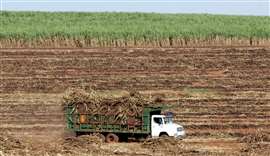Partners plan ethanol energy test in Brazil
28 March 2025
 A truck carries a load of sugarcane to a refinery in Brazil (Photo: Reuters)
A truck carries a load of sugarcane to a refinery in Brazil (Photo: Reuters)
Brazil is renowned for its production of ethanol from sugarcane – most new passenger vehicles sold in the country are bi-fuel, in that they can use petrol/gasoline and ethanol (sold as ‘álcool’) in any percentage combination.
On the forecourt, ethanol is marginally less expensive than petrol, but higher temperatures (thermal inefficiency) in the combustion process mean that it delivers slightly lower range per litre. That said, ethanol has a higher octane rating than petrol – about 100, compared to 93 or 95 – so delivers slightly more power.
The South American country is also known for its green energy supply. In 2023, 93.1% of the energy delivered by Brazil’s national grid came from renewables, the vast majority of this from hydroelectric installations.
Bringing these two areas together for the first time, Finnish technology group Wärtsilä and Energetica Suape, a Brazilian energy company, are now set to start a collaboration which will investigate the use of ethanol for large-scale energy production.
Based at the Suape II power station in Recife, located on the north-east coast of Brazil, the test will see an ethanol-fuel engine delivering power to the grid.
“Brazil is a world leader in ethanol production, but its potential use in electricity generation has up to now been overlooked,” said José Faustino Cândido, chief Technology officer at Energetica Suape II. “This project aims to change that by delivering thousands of hours of testing, which we hope will demonstrate the role that ethanol could play in Brazil’s future power system.”
“This initiative could be a game-changer in advancing sustainable energy solutions and shaping the future of clean power generation in Brazil, reducing greenhouse gas emissions, and decreasing dependence on fossil fuel imports. Ethanol could also play an important role in the decarbonisation of the electricity sector, as it is readily available today and can be easily transported globally, making it a truly accessible and scalable solution”, says Anders Lindberg, President, Wärtsilä Energy.
Wärtsilä will operate and maintain the engine under an Operation and Maintenance agreement with Energetica Suape II. The two-year test will cover supply reliability and performance guarantees throughout the customer’s current power purchase agreement (PPA), which runs until the end of 2026.
Lower rainfall in some regions around Brazil have impacted hydroelectric power generation, to the point where there have been supply issues leading to local government requests to conserve power. It’s possible that should the test prove successful, ethanol could help to make up that energy shortfall.
POWER SOURCING GUIDE
The trusted reference and buyer’s guide for 83 years
The original “desktop search engine,” guiding nearly 10,000 users in more than 90 countries it is the primary reference for specifications and details on all the components that go into engine systems.
Visit Now
STAY CONNECTED




Receive the information you need when you need it through our world-leading magazines, newsletters and daily briefings.
CONNECT WITH THE TEAM









